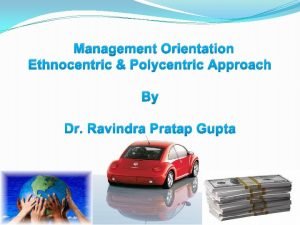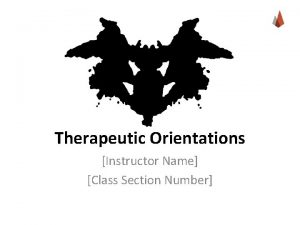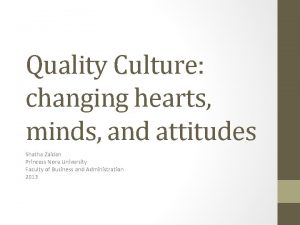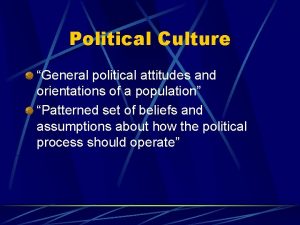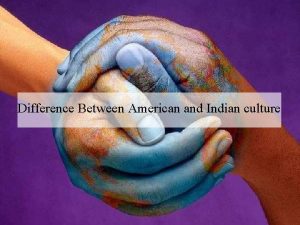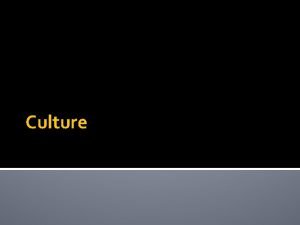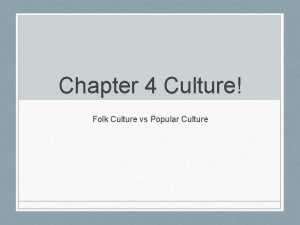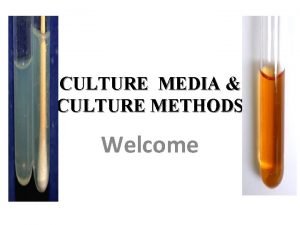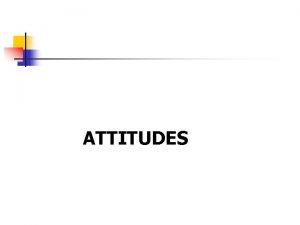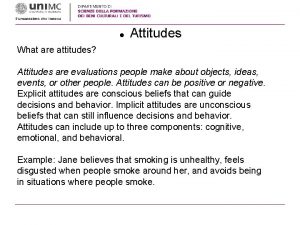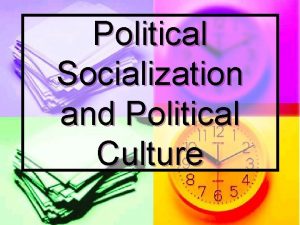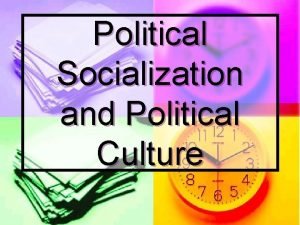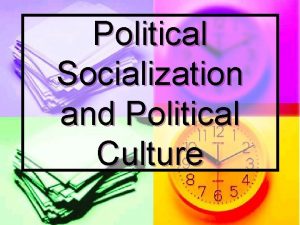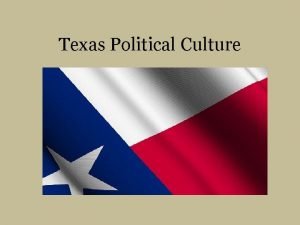Political Culture General political attitudes and orientations of





![Political Socialization “The way children [and others] are introduced to the values and attitudes Political Socialization “The way children [and others] are introduced to the values and attitudes](https://slidetodoc.com/presentation_image_h/95e7d510064163c27ac78fe2aa74ad60/image-6.jpg)






- Slides: 12

Political Culture “General political attitudes and orientations of a population” “Patterned set of beliefs and assumptions about how the political process should operate”

American View of the Political System Liberty: “My freedom ends where yours begins” Equality: Equal before the law; equal chance to participate and succeed (Equality of Opportunity? ) Democracy: “By the people, for the people, and of the people. ” Civic Duty: Volunteer and help out (Kennedy’s “Ask not what your country can do for you…) Individualism: Take responsibility for your own actions and well-being. Don’t blame the system.

American View of the Economic System Free Enterprise Democracy = Capitalism Support of government regulation of business to correct abuses and keep firms from becoming too powerful. (Anti-monopoly) Communism/Socialism evil Equality of Opportunity; Not Equality of Condition (Results)

Comparison to Other Countries Sweden- More deferential. High voter turnout, but little political participation other than that. Value harmony. Japan- Group decision-making, respect for hierarchy Americans tend to have a strong sense of civic duty and civic competence, but that translates to action in areas such as campaigning, contacting officials, and attending political meetings. We lag behind many European countries in voter turnout. We favor equality of opportunity. Sweden vs. U. S. example on pg. 82.

American View of Religion Very religious Protestant roots Religion much more important compared to Europe. Religion found in national elections, not true in most contemporary democracies. Role of religion changing? “Under God” controversy
![Political Socialization The way children and others are introduced to the values and attitudes Political Socialization “The way children [and others] are introduced to the values and attitudes](https://slidetodoc.com/presentation_image_h/95e7d510064163c27ac78fe2aa74ad60/image-6.jpg)
Political Socialization “The way children [and others] are introduced to the values and attitudes of their society” Sources which “develop, reinforce, and transform” political culture Direct: Conscious inculcation Indirect: By example Ongoing process

Sources of Political Culture is transmitted primarily by the family. History of religious and ethnic diversity, individualistic philosophy, and fragmented political authority have led to an absence of a high level of class consciousness. Irony that most Americans, when asked, view themselves as “middle class. ”

The Culture War Instead of a struggle between economic classes as we see in many places, we see a war over values between cultural classes in the United States. Orthodox- A belief that morality and religion ought to be of decisive importance. Progressive- A belief that personal freedom and solving social problems are more important than religion.

The Culture War Eliminating stereotypes l l Being orthodox does not necessarily mean one is a religious fanatic. It means one has strong views about things like drugs, pornography, sexual morality…etc. Being progressive does not mean you are godless and immoral. It means you believe that religion doesn’t hold all of the answers to the world’s problem, and that it can create divides in societies and cause harm in some cases.

Mistrust of Government “Throw the rascals out” Politicians are corrupt Chart on pg. 87. The 1960 s and 1970 s fundamentally changed the way we view the government. l Vietnam, economic problems, Watergate, civil rights revolution, urban riots, etc.

Political Efficacy Ability to understand take part in politics (Internal) or the government will respond its citizens (External) Internal Efficacy stayed the same since the 1950 s and 1960 s. Americans feel politics is confusing. External Efficacy decreased but higher than Europe As Americans trust political institutions and leaders less, they are more likely to support nonincumbents and third-party candidates.

Political Tolerance Do Americans really believe in Free Speech? l Protestants holding a revival l Right-to-life groups opposing abortion l People protesting a nuclear power plant l Feminists organizing march to support ERA l Gays organizing for homosexual rights l Atheists preaching against God Political Tolerance increasing? l Americans say they are more likely to vote for a qualified candidate regardless of race, religion, or creed. l At the same time, most Americans believe most serious civic problems can be traced to a breakdown in moral values.
 What is ethnocentric orientation
What is ethnocentric orientation Therapeutic orientations
Therapeutic orientations 5 marketing management orientations
5 marketing management orientations Quality culture vs traditional culture
Quality culture vs traditional culture Political attitudes examples
Political attitudes examples What is cultural relativism
What is cultural relativism Batch culture vs continuous culture
Batch culture vs continuous culture Indian vs american culture
Indian vs american culture Stroke culture method
Stroke culture method Folk culture and popular culture venn diagram
Folk culture and popular culture venn diagram Chapter 4 folk and popular culture
Chapter 4 folk and popular culture Stab culture and stroke culture
Stab culture and stroke culture Homework due today
Homework due today
